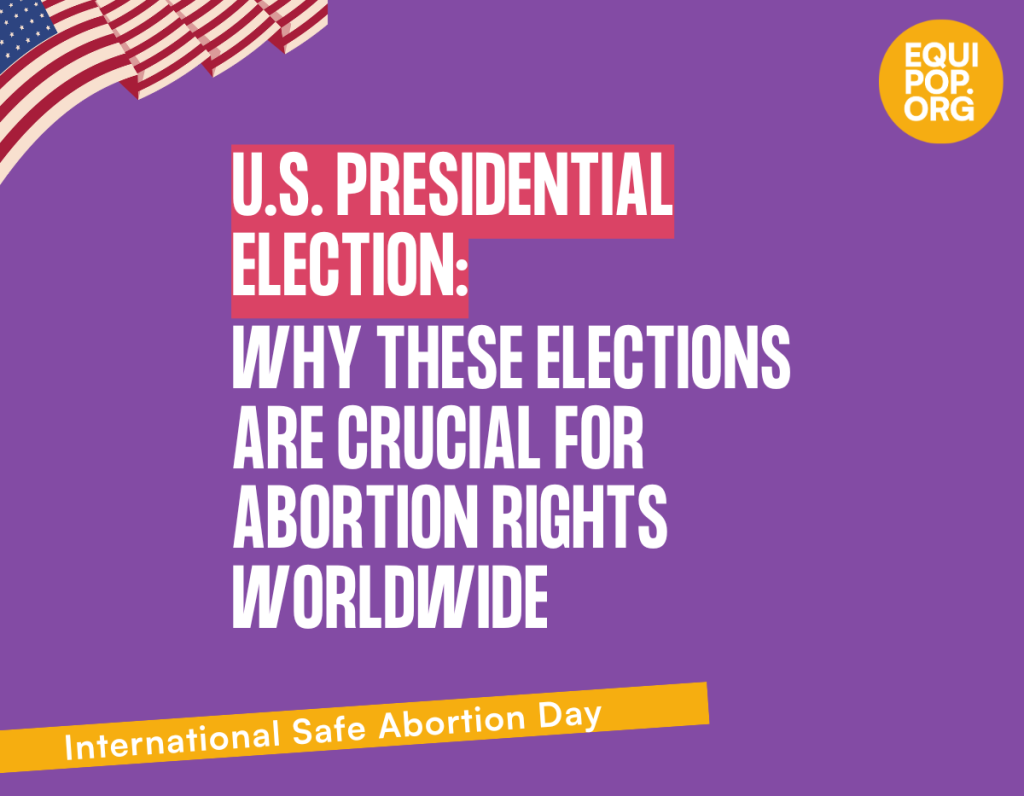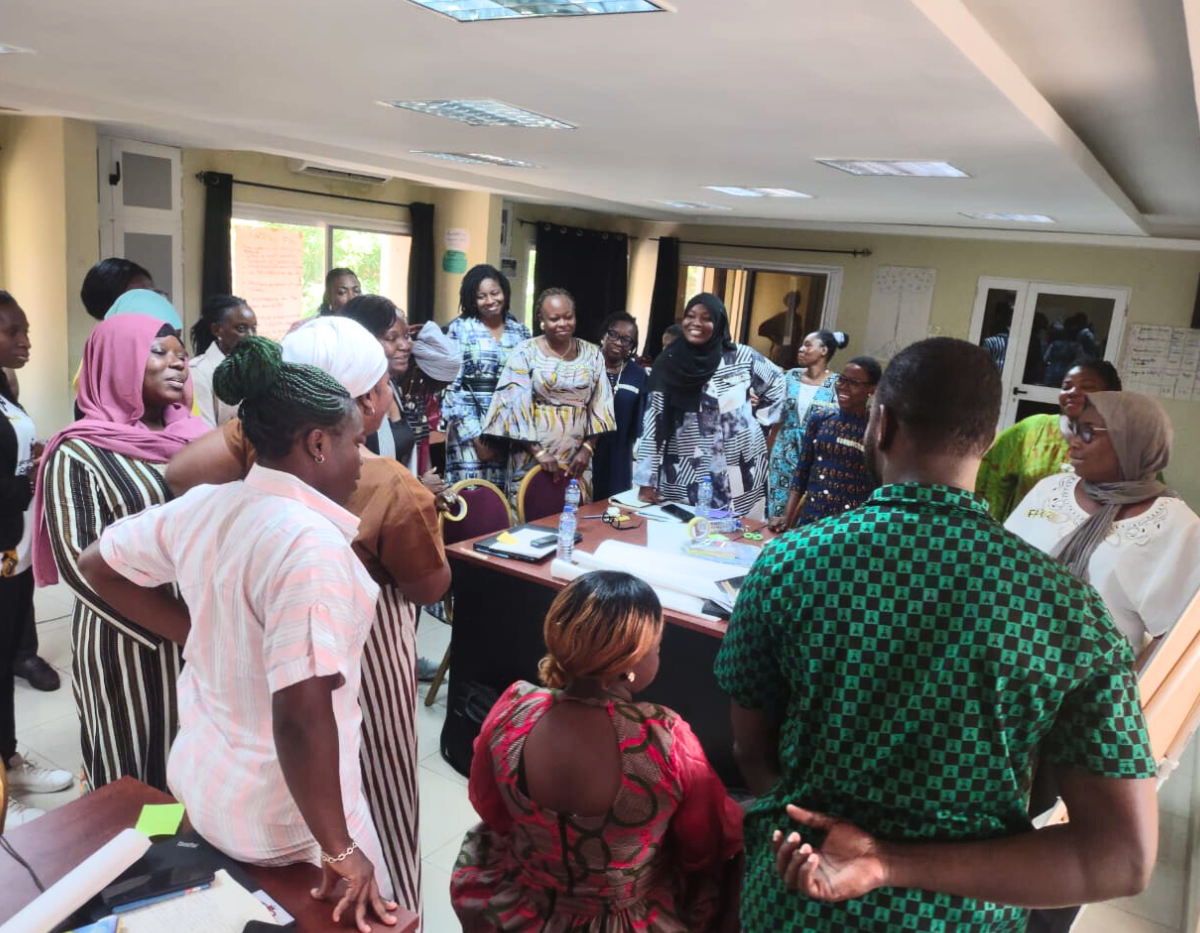On November 5, 2024, nearly 244 million voters will head to the polls to elect the next President of the United States. Polls predict a tight race between Kamala Harris and Donald Trump, especially in key swing states where the outcome could be decided by just a few votes. A Trump victory would have significant repercussions far beyond U.S. borders, with consequences for sexual and reproductive health and rights (SRHR) and gender equality on both the national and international stages.
Sexual and reproductive health and rights: a break line in the 2024 campaign
The issue of abortion rights has long been a point of contention between Democrats and Republicans, but the divide has grown deeper since the 2022 overturning of Roe v. Wade, which brought abortion back to the forefront of public debate. This decision had international reverberations, giving the debate global significance. During the televised debate between Kamala Harris and Donald Trump on September 10, 2024, the former U.S. president spread misinformation about abortion, which was fact-checked by ABC journalist Linsey Davis, along with other racist statements from the Republican candidate. This is a typical strategy of anti-rights groups to demonize abortion and stigmatize women who seek it, as well as the healthcare professionals who support them in the process. In contrast to Trump’s misogynistic remarks, Kamala Harris made abortion rights a central focus of her campaign, stating in her July kickoff speech that she would sign any congressional bill aimed at restoring this right. In its report on backlash, Equipop already highlighted the dangers of Trump’s administration to women’s and LGBTQIA+ rights. Under his presidency, laws on gender equality and SRHR were attacked, including contraceptive coverage, pay equity, measures against gender-based and sexual violence, as well as legal protections for LGBTQIA+ people. The « Global Gag Rule » cut U.S. funding for international abortion access. These actions are just a preview of what a second Trump term could bring, particularly if he implements « Project 2025. »
If implemented, “Project 2025” will trigger global shockwaves
This month, RFSU, Equipop’s partner in Sweden, published a report warning about « Project 2025, » an ultraconservative plan aiming to harden anti-gender laws and undermine sexual and reproductive rights. Developed under the influence of the powerful ultraconservative think tank « Heritage Foundation » and supported by more than 80 associations and organizations, including Catholic and Evangelical groups, « Project 2025 » is presented as a roadmap for the next administration in 2025. Despite Trump’s public denials of his involvement in « Project 2025, » a CNN investigation reveals that at least 140 former members of his administration contributed to it. This project outlines a series of policy recommendations that go beyond restricting abortion, including plans to limit access to contraception. If implemented, this project will have a significant impact on maternal health and gender equality more broadly. The plan is based on an extreme interpretation of the U.S. Constitution, known as the « unitary executive theory, » which concentrates executive power in the hands of the president. Having participated in several intergovernmental processes, such as the UN’s Commission on the Status of Women (CSW) or the G7, Equipop has witnessed Trump’s administration’s attempts to sabotage negotiations, even questioning basic terms like “gender.” Alongside its partners, Equipop has been mobilizing for years against this backlash. Beyond the figurehead of Donald Trump, anti-rights movements are taking shape across all continents. Other leaders, such as Javier Milei in Argentina, who plans to repeal the law guaranteeing the right to abortion, or Viktor Orbán, who hardened legislation in 2022 by forcing women to listen to the fetus’s heartbeat before an abortion, share this anti-choice and regressive agenda. In Côte d’Ivoire, homophobic rhetoric is on the rise, while in Senegal, the total ban on abortion, influenced by anti-choice movements, remains in place. In France, too, far-right ideas are dangerously gaining ground, as evidenced by the rise of the Rassemblement National (RN) and the increasingly conservative rhetoric of Les Républicains (LR), particularly on abortion and LGBTQIA+ rights. During the debates on enshrining the right to abortion in the constitution, some LR members proposed an amendment invoking « the protection of unborn life. » If implemented, « Project 2025 » will trigger international shockwaves. Its authors aim to reshape U.S. diplomacy by promoting anti-choice and anti-LGBTQIA+ programs within international bodies like the UN. They seek to redefine human rights, distorting norms established by the Universal Declaration of Human Rights and other international conventions. Additionally, they advocate for U.S. withdrawal from international organizations and traditional diplomatic alliances. With the rise of the far right in Europe, there is a risk that this project could serve as a template for far-right groups both within the European Parliament and within countries themselves. Finally, this project would lead the United States, currently the largest donor of official development assistance, to drastically cut funding for gender equality and access to health care. For instance, according to the RFSU report, the US continues to be the largest donor to HIV programs at $6.1 billion, providing 74% of all donor government HIV funding. Finally, the RFSU report reminds us that even if Kamala Harris wins in November, « Project 2025 » will continue to exist and influence public policy. The Geneva Consensus Declaration, which contests abortion and was inspired by this project, still shapes the diplomacy of many states, despite the departure of the Trump administration. Today, organizations linked to « Project 2025, » such as the Institute of Women’s Health (IWH), continue to promote it and rally new signatories, with the support of the Hungarian government.
Solidarity with Women in the U.S. and Worldwide: How Can We Push Back Against These Anti-Rights Movements?
As European feminist diplomacy faces setbacks, particularly with its abandonment in Sweden and the retreat of other governments like the Netherlands, France’s role becomes all the more crucial. The recent appointment of the new French government raises many questions among feminist organizations, which are skeptical about the attention women’s rights will receive, given the anti-feminist and LGBTQIA+-phobic positions of several ministers. Michel Barnier has indeed stated that the rights secured by the Veil Law and marriage equality would be « preserved, » but this must be accompanied by strong measures, including on the international stage. During his participation in the United Nations General Assembly, Minister Jean-Noël Barrot reiterated the upcoming conference on feminist foreign policy to be held in France in 2025 and urged his counterparts to defend abortion rights globally. This is the stance that must be maintained to implement the commitments of French « feminist diplomacy, » whose new strategy is expected soon. The media also has a key role to play in analyzing these elections through a lens that integrates gender and sexual and reproductive rights, notably by inviting feminist experts on television panels and in newspaper columns. Finally, as citizens, it is essential to show solidarity with women in the U.S. and wherever abortion rights are under attack. In this spirit, Equipop calls for joining the demonstration organized by the Collective « Abortion in Europe: Women Decide » on Saturday, September 28, in honor of International Safe Abortion Day.





